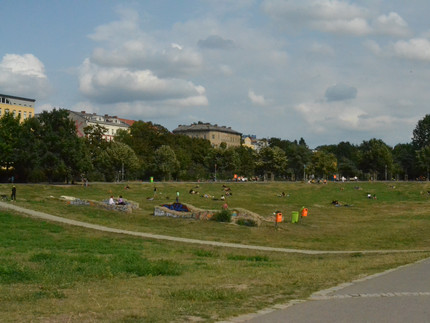Italian in Transit and the GörliPark Corpus
Marta Lupica Spagnolo
Italian in Transit
Multilingualism is widely recognized as a socially and scientifically relevant topic. However, the outcome (of fragments) of languages that are temporarily acquired on the move during a person’s lifetime remains largely unexplored. This project tries to fill this gap by investigating a continuum of multilingual practices based on the Italian language, for which I propose the label ‘Italian in Transit’ (Lupica Spagnolo 2023).
Italian in Transit competences are acquired by multilingual migrants and refugees along their migration or escape routes in Italy and are occasionally reactivated after moving to other countries. As they develop in situations of intense language contact and are reactivated in extremely precarious communicative situations, Italian in Transit practices show similarities with both heritage languages and leaner varieties of Italian acquired without supervision in Italy. However, Italian in Transit is neither an in-group code nor a sociolinguistically dominant language in the new places of residence. This predisposes it to develop distinctive linguistic features, partly influenced by contact with other languages, partly accelerating grammaticalization processes in colloquial Italian, and partly determined by more general principles also at work in the pidgin and creole languages. These include, for example, the generalization of present infinitives to express durative, background events (Lupica Spagnolo 2023), specific patterns of code-switching and language choice (Lupica Spagnolo 2025b), the overextension of troppo 'too much' to convey high intensity rather than excess (Lupica Spagnolo 2025a), and the variable realization of sentence negation through semi-innovative constructions (Lupica Spagnolo in press1).
The GörliPark corpus
My dataset, the GörliPark corpus, consists of twenty-five interviews and and about 50 unrecorded conversations conducted in Italian with multilingual migrants and refugees working as street vendors in a park in the city of Berlin, Germany.
The data was collected in several phases from October/December 2018 to Mai 2024. The conversations mainly focus on the participants’ language biographies and migratory experiences, as well as on their language uses in the German capital. The corpus has been transcribed using the software ELAN.
The interviewees are all male and mostly come from sub-Saharan West Africa, in particular The Gambia, Senegal, and Guinea. Because of the sociolinguistic situations in the countries, they lived in, and their intricate migration routes, their language repertoires are very complex (= superdiverse).
The majority of the participans have learned Italian because they lived in one or more Italian cities over a variable period of time (from nine months up to eleven years). However, three speakers have acquired Italian competencies after moving to Berlin. The Italian skills of the participants are highly variable both inter- and intraspeaker. Nevertheless, an analysis of position and form of sentence negation points out that all participants (except for one) have overcome a pre-basic stage and speak basic up to post-basic learner varieties of Italian (Lupica Spagnolo in press1). In Berlin, the participants occasionally reactivate their Italian language skills for different communicative purposes.
Il GörliPark corpus è costituito da 25 interviste condotte in italiano e circa 50 conversazioni non registrate con migranti e rifugiati che lavorano come venditori ambulanti in un parco della città di Berlino in Germania.
I dati sono stati raccolti in diverse fasi, dall'ottobre/dicembre 2018 al maggio 2024. Le conversazioni vertono principalmente sulle biografie linguistiche e le esperienze migratorie dei partecipanti così come sui loro usi linguistici nella capitale tedesca. Il corpus è stato trascritto tramite il software ELAN.
I partecipanti del GörliPark corpus sono tutti uomini e provengono principalmente dall’Africa occidentale subsahariana, in particolare, dal Gambia, Senegal e dalla Guinea. In conseguenza della situazione sociolinguistica dei paesi in cui hanno vissuto e dei loro intricati percorsi di vita, i repertori linguistici degli intervistati del GörliPark corpus sono altamente complessi (=superdiversi).
La maggior parte degli intervistati ha acquisito competenze in italiano perché ha vissuto per un periodo di tempo variabile (da nove mesi a undici anni) in una o più città italiane. Tuttavia, tre parlanti hanno imparato l'italiano dopo essersi trasferiti a Berlino. Le competenze in italiano dei partecipanti sono molto variabili sia tra parlanti diversi sia nel corso di una stessa intervista. Tuttavia, un'analisi preliminare della forma e posizione della negazione di frase suggerisce che tutti gli intervistati (ad eccezione di uno) abbiano superato lo stadio prebasico e parlino varietà di apprendimento basiche o postbasiche di italiano (Lupica Spagnolo in press3). A Berlino, i partecipanti riattivano occasionalmente le loro competenze in italiano per scopi comunicativi diversi.
References
Please cite the corpus as follows. Per favore citate il corpus nel modo seguente.
Lupica Spagnolo, Marta (2023): Italian in Transit: Attempting a definition based on the distribution and functions of generalized present infinitives. Italian Journal of Linguistics 35/ 1, 159–184.
Other publications
Lupica Spagnolo, Marta (2025a): Intensifiers in Italian in Transit: Tracing biographical experiences through language practices. Italiano LinguaDue, 17(1), 187–215. https://doi.org/10.54103/2037-3597/29076
Lupica Spagnolo, Marta (2025b): Italian in Transit: Superdiverse repertoires and code-switching in Italian-based multilingual practices in a Berlin park. In: Di Salvo, Margherita & Goria, Eugenio (eds.): Italo-Romance Heritage Languages: multiple approaches [Studies in Bilingualism 68], Amsterdam: Benjamins, 247–288. https://doi.org/10.1075/sibil.68.11lup
Lupica Spagnolo, Marta (in press1): La negazione di frase in Italiano in Transito: tra fossilizzazione e innovazione. In: Dessì Schmid, Sara / Eufe, Rembert / Momma, Lydia / Sigmund, Mirjam / Vincis, Valentina (Eds.): Tempo e spazio: forme, testi, storia. Tübingen: Narr, [1–18].
Lupica Spagnolo, Marta (in press2): Italiano in transito. In: Serena, Enrico & Vedovelli, Massimo (eds.): Dizionario dell'italiano L2: insegnamento, apprendimento, ricerca [Collana ‘Studi di linguistica educative’, e-book]. Pisa: Pacini, [1].

